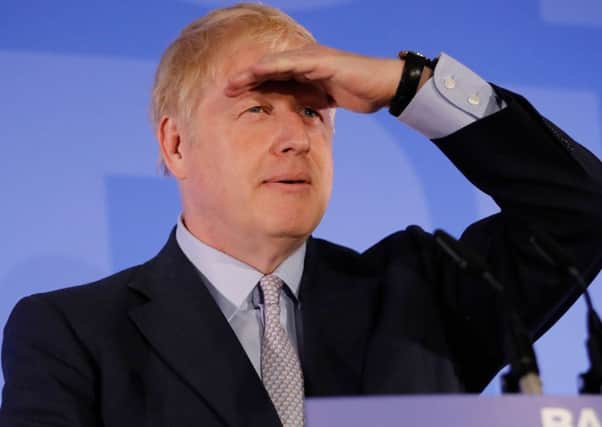Brexit: Why Boris Johnson won’t last long as Prime Minister – Bill Jamieson


Fast forward a few weeks as we yearn for a more stable and certain future. Mercifully, the fractious Tory leadership hustings are over. Boris Johnson, the new Prime Minister, is installed, pledging from the familiar rostrum wheeled out in front of 10 Downing Street that he will seek to unite the country.
In the background, noisy protests can be heard. Misgivings are vented. But at least there is a sense of fresh start. The exasperating vacuity of the May premiership is a fading memory. It’s a new beginning, a break from the old. A page has been turned.
Advertisement
Hide AdAdvertisement
Hide AdNow fast forward a few weeks more. The past is not behind us – it’s slap bang in front as if nothing has changed. We will witness the familiar sight of senior British officials arriving in limousines at Brussels to seek to open fresh negotiations – only to be told no changes can be made to the Withdrawal Agreement.
The Prime Minister returns to parliament to sanction a ‘no deal’ departure from the EU by 31 October. In the Commons, all-too-familiar division and bitterness erupt: the same arguments, the same faces – and the same results. The Government fails to win support for critical motions to approve our exit. The Prime Minister goes back to Brussels to seek an extension of the departure deadline. This is declined.
Mr Johnson returns to Westminster to insist that he will go ahead with departure in any event. Business leaders erupt in fury. The pound and the stock market suffer sharp sell-offs. At this point, the opposition tables a motion of no confidence. Sufficient backbench Tory rebels abstain or vote in favour. The Government falls and a general election is called.
Nothing we have experienced in the past three years is likely to compare to the fury unleashed in the resulting national furore. And the result? Failure to return an administration with an overall majority. After frenetic days of negotiation, a Labour minority administration takes office, supported by the SNP and MPs from other parties. Thus does Boris Johnson, slam-dunk winner of the Tory hustings, dispenser of hope and optimism, champion of our Hallowe’en Brexit exit, become one of the shortest premierships on record – and the fifth Conservative leader to be brought down by ‘Europe’.
So do not despair if you feel none the wiser after those TV debate hustings. For few are any the wiser – including, I suspect, some of those who took part. We are no nearer to finding a pathway out of the Brexit morass.
For Britain is broken on the wheel of Europe – whether we leave, dither on the doorstep or give up and opt to Remain. And broken, too, are the two parties that have dominated UK politics for almost a century.
Within the Conservative Party, termites have long been at work. Its central motivating ideas have suffered a fateful corrosion. The great post-war swathes of renewal that brought momentum – the adoption of the mixed economy welfare state in the wake of the crushing defeat of 1945, the conversion to neo-liberalism in the late 1970s – have faded.
Today, as the leadership contenders seek to outflank each other in virtue-signalling and to outspend each other with tax cuts and lofty commitments to greater welfarism, there is no longer any meaningful definition of Conservatism: traditionalists are driven out and no-one seems to know beyond the mythical 31 October what the motivating drive really is – other than ‘not Corbyn’.
Advertisement
Hide AdAdvertisement
Hide AdLabour is hardly in any better state. It is not just that on Europe there is confusion as to whether it is for Leave or Remain. Its leadership is also under increasing question. How far will it persist with its programme for re-nationalisation, higher taxes and massive spending increases? Now imagine a similar TV leadership hustings for the opposition party: what unity of approach would emerge were the five contenders on the TV bar stools to be Jeremy Corbyn, deputy leader Tom Watson, the shadow chancellor John McDonnell, Sir Keir Starmer and shadow Home Secretary Diane Abbott?
Strange though it may seem at present, there has seldom been a better opportunity for a rejuvenated Liberal Democrat Party to storm through and champion the cause of the wearied, exasperated, and desperate ‘none of the above’.